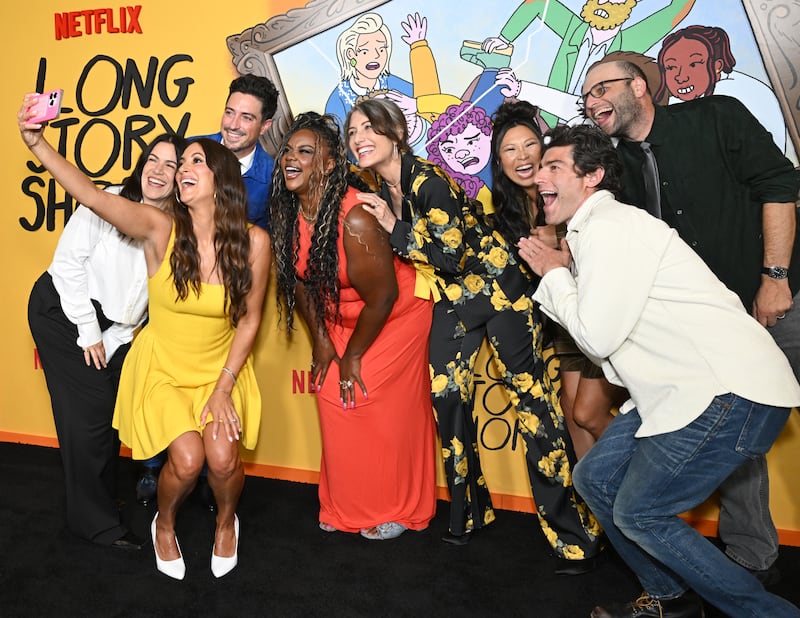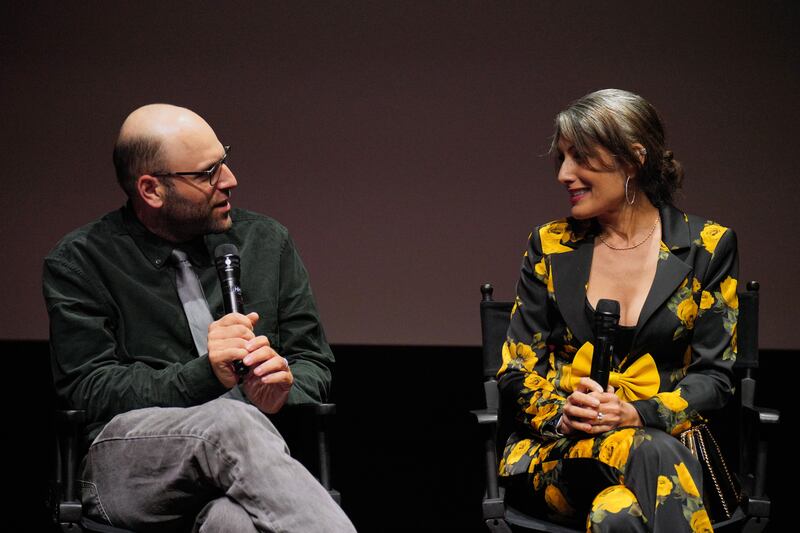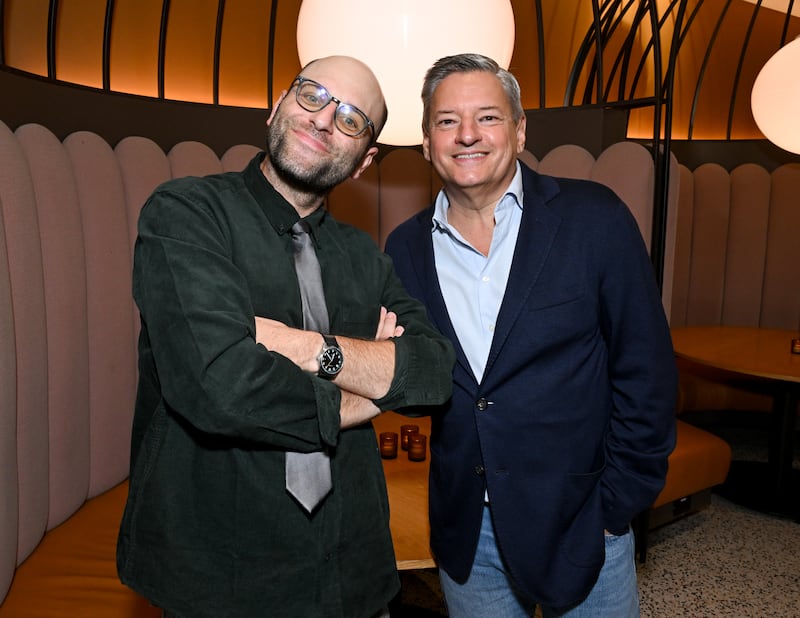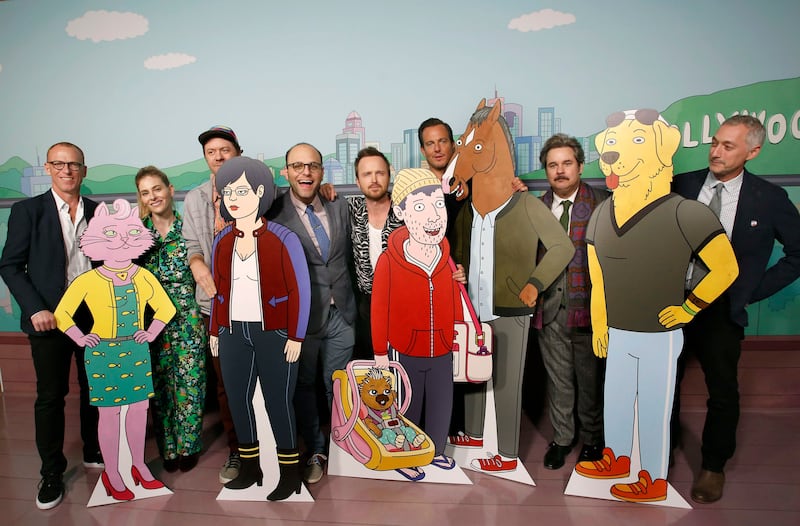Raphael Bob-Waksberg was still in his 20s when he convinced Netflix to produce his audacious Hollywood satire about a washed-up, alcoholic former TV star who also happens to be a horse. Now, as a 41-year-old father of two, the creator of Bojack Horseman is back with another animated Netflix series that is just as boldly funny and devastatingly emotional, but without the crutch of constant animal puns.
In this episode of The Last Laugh podcast, Bob-Waksberg opens up about his “vulnerable” new show, Long Story Short, which depicts a Jewish family in the Bay Area that is not unlike his own. He breaks down how the show’s unique time-jumping format cleverly tricks viewers into feeling like they have known the characters for years and reflects on how the essential Jewishness of the story has been interpreted—or perhaps, misinterpreted—by critics. Bob-Waksberg also looks back on the legacy of Bojack, including what it did or not predict about the state of “Hollywoo” in 2025 and what it would take for him to revive those characters after saying goodbye to them five years ago.
“I think there’s a level of meta commentary or irony that exists in Bojack Horseman that I stripped out of this show,” Bob-Waksberg says of Long Story Short. While the characters on Bojack almost knew they existed in a TV show, the family at the center of his new series feels real—and deeply familiar, especially if you come from a certain type of Jewish upbringing.
“I think it’s a little bit, for me at least, riskier to write something without that level of irony to it,” he adds. “There’s an armor in saying things out of one side of your mouth while the other side is saying, ‘Yeah, but we don’t really care about any of this.’ And I think this is a more vulnerable show in that it’s saying, yeah, we care about this stuff.”
Early in the show, Bob-Waksberg illustrates his sincere approach to the passage of time by having the character of Avi, voiced by Ben Feldman (Superstore, Mad Men), discuss the lyrics of Paul Simon’s “The Obvious Child”: “We had a little son and we thought we’d call him Sonny / Sonny gets married and moves away / Sonny has a baby and bills to pay.”
“I feel like it’s so cleanly conceptualizes the way the show works and some of the big ideas behind the show,” Bob-Waksberg says of the song, which plays over the closing credits of the first episode. “It felt like a really helpful introduction to our audience of what this show is going to be about.”

The song tells a story about a child moving “very quickly through time—almost astonishingly so.” In the same way, we meet the Schwooper family (a portmanteau of Schwartz and Cooper) when their three children are young and then very quickly see who they have turned into as adults.
In addition to Avi, the Schwooper family includes middle daughter Shira (Broad City’s Abbi Jacobson) and youngest son Yoshi (New Girl’s Max Greenfield). Their parents are voiced by comedian Paul Reiser, and, in a revelatory depiction of a domineering Jewish mother, Lisa Edelstein, who up until now was probably best known for her role on House. Calling her work on the show “fantastic,” Bob-Waksberg says, “It feels like she’s playing in a different gear here and it’s really delightful to experience.”

Much of the press around Long Story Short’s premiere last month framed it as a fundamentally Jewish show—at a time when both antisemitism feels more potent than it has been in decades and when the Jewish experience feels inextricably linked to the horrific war in Gaza. “I think it’s OK if it gets people to watch it,” Bob-Waksberg says of the coverage. “If it makes people not want to watch it, then I don’t like.”
The narrative timeline of the show’s first season stretches over decades but ends before the events of October 7, 2023. But because it has already been picked up for a second season, Bob-Waksberg has had to consider if, and how, he might use the show to tackle everything that has followed.
“I don’t want to do it out of obligation,” Bob-Waksberg says, carefully. “Right now, what’s happening over there makes me want to scream. It makes me want to curl into a ball and get in bed. It doesn’t inspire me to be witty or thoughtful or persuasive. And I don’t know how to translate that into my show yet. Maybe we will, but the death and destruction that is occurring over there in Gaza is not what my show is about. And I don’t want to graph that onto my show to make it seem more important. I mean, I don’t even know if centering a Jewish American family is the proper way to discuss that. But it’s something that I grapple with and I take very seriously.”

Ultimately, Long Story Short is less about the global Jewish experience and much more about Bob-Waksberg’s ultra-specific Jewish experience growing up in the Bay Area with a family that was semi-religious—neither the type of secular, cultural Jews who Americans came to know through comedies like Seinfeld and Reiser’s Mad About You, nor the Hasidic sect that has been depicted on dramas like Netflix’s Unorthodox.
“I think that Jews are very excited to have a show that feels Jewish,” Bob-Waksberg says. “And I think for a lot of Jews, the show might feel Jewish in a new way, or feels specifically Jewish in ways that other shows have not.”
For him, at least, faith is not the “defining feature of what it means to be Jewish.”
“Even the people who practice, who do the holidays, who keep kosher, it’s not necessarily because we believe in God and that if we do the right things, we get into heaven,” he explains. “It’s more about culture and history and tradition and community. And so show an actively religious family where faith was not the defining pretext, that felt important and distinctive to me.”
All of this is worlds away from the broad Hollywood satire of Bojack Horseman, even while both shows center the type of hyper-specific, reference-heavy jokes at which Bob-Waksberg and his writing team excel.

“Part of the fun of BoJack was, in the pitch at least, that we were going to slowly reveal what kind of show this is,” he recalls. “We’re going to start as a very goofy, broad comedy with maybe a few hints of darker edges.” It wasn’t until the end of that first season in 2014 that viewers truly understood how dark that show could get. As successful as Bojack Horseman was, both critically and commercially, Bob-Waksberg acknowledges now that many viewers probably only checked out the first episode then gave up without learning where the story was going.
“So part of my goal on Long Story Short was, I want to tell the audience what the show is as quickly as possible,” he says. “I don’t wanna be coy about it. I want to hit the laughs, I want to hit the heart, I want to get the emotion, I want you to understand the time jumping element, I want you to know this family.”
But while he’s already hard at work on continuing that family’s story into Season 2, Bob-Waksberg has not fully ruled out a return to the Bojack Horseman universe at some point in the future.
“I’m more interested in doing new things than revisiting the past,” he says. “So I think there would have to be something pretty scintillating about the prospect to make me want to go back to the world of Bojack.” Rather than additional seasons of the same show, he can more easily imagine a new show with “some of those characters” returning to the screen.
He then adds with a laugh, “And they would have to give me a lot of money.”
Listen to the episode now and follow The Last Laugh on Apple Podcasts, Spotify, or wherever you get your podcasts to be the first to hear new episodes when they are released every Wednesday.
The post Raphael Bob-Waksberg Made a Perfect Hollywood Satire—Now He’s Looking Inward appeared first on The Daily Beast.




